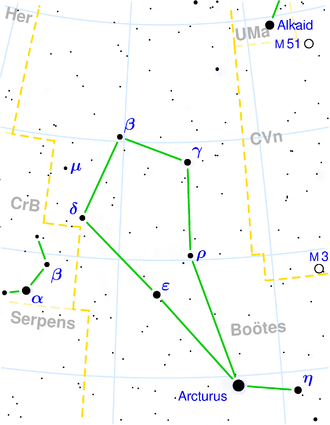NGC 5895
| Galaxy NGC 5895 |
|
|---|---|

|
|
| NGC 5896 & NGC 5895 (below) SDSS image | |
| AladinLite | |
| Constellation | Bear keeper |
|
Position equinox : J2000.0 , epoch : J2000.0 |
|
| Right ascension | 15 h 13 m 50.0 s |
| declination | + 42 ° 00 ′ 27 ″ |
| Appearance | |
| Morphological type | Sc |
| Brightness (visual) | 14.2 mag |
| Brightness (B-band) | 14.9 mag |
| Angular expansion | 0.9 ′ × 0.2 ′ |
| Position angle | 21 ° |
| Surface brightness | 12.2 mag / arcmin² |
| Physical data | |
| Redshift | 0.017856 ± 0.000140 |
| Radial velocity | (5353 ± 42) km / s |
|
Stroke distance v rad / H 0 |
(245 ± 17) · 10 6 ly (75.0 ± 5.3) Mpc |
| history | |
| discovery | RJ Mitchell |
| Discovery date | May 23, 1854 |
| Catalog names | |
| NGC 5895 • UGC 9774 NOTES01 • PGC 54366 • CGCG 221-042 NED01 • MCG + 07-31-043 • IRAS F15120 + 4212 • GC 4072 • NSA 69289 • HOLM 701A | |
NGC 5895 is a 14.3 mag bright spiral galaxy of the Hubble type Sc in the constellation Bear Keeper in the northern sky . It is an estimated 245 million light years from the Milky Way and about 65,000 ly in diameter. It is likely gravitationally tied to NGC 5893 . Together with NGC 5896 they form the optical galaxy trio HOLM 701 .
The object was discovered on May 23, 1854 by RJ Mitchell , an assistant to William Parsons .
Web links
- NGC 5895. SIMBAD , accessed May 11, 2016 .
- NGC 5895. DSO Browser, accessed May 11, 2016 .
- Auke Slotegraaf: NGC 5895. Deep Sky Observer's Companion, accessed on May 11, 2016 .
